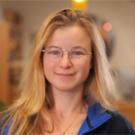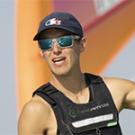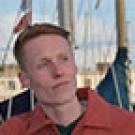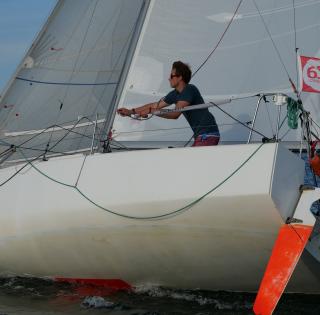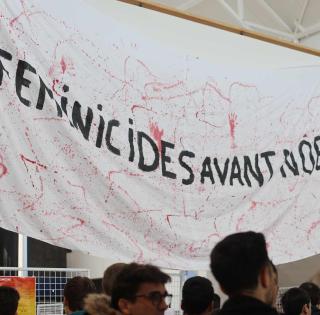
What do you remember most about this adventure?
My favorite part of this voyage was the people I met. In the Canary Islands, I crossed paths with Sibylle and Thomas, a couple who are sailing enthusiasts. We became very close friends and have remained in touch. I also met other very nice people such as couples of travelers, my neighbors on the pontoon in Martinique, Corto a student from ENSTA Bretagne, and finally some sailing enthusiasts with very inspiring backgrounds like Yann Quénet and Philippe. There is real mutual aid and closeness between sailors on the pontoon, where age difference no longer matters.

Did you encounter any difficulties?
The four of us left Brest for Lisbon (my father, Benjamin who was also a student at ENSTA Bretagne, his brother and myself), and after a stopover in Lisbon where we dropped my father and his brother off, we headed for the Canaries where we had to have the boat repaired for three weeks because of a leak caused by the breakage of the stern tube. As it was a race against time, we preferred to cancel our stopover in Cape Verde.
The second major difficulty that we had to overcome with Benjamin, was to sail for a week with no autopilot in daily winds in excess of 30 knots, sometimes rising to 50 knots at night, which was a trying experience during which we had to push ourselves to the limits.
What did this crossing mean for you from a personal perspective?
Before this crossing, I was shyer than I am now. Through the people I met, I have become more open to others. I also gained in confidence. Fortunately, Benjamin was there when I lost my temper a little when the autopilot broke on the outbound journey! This experience helped me a lot as when we another incident arose after we came back, I was able to analyze the situation more calmly. I also increased my resourcefulness, especially when I was able to repair broken parts with the few tools I had on board.

What did this experience mean for you from a professional perspective?
I gained a lot of knowledge about sailing onboard other boats during my stopovers. In Martinique, I worked in a sailmaker's shop for a little over three months. This really piqued my interest in this field and also helped me improve my English. I learned a lot from this professional experience, during which my colleagues and I did favors for each other and shared our technical skills. I am currently in contact with a sailmaker for my end-of-studies internship (PFE) and would like this project to become a reality, with a view to perhaps later having the opportunity to make sails for racing boats.
This experience also made me want to find out more about entrepreneurship. In Martinique, I had the chance to meet Philippe, a sailing enthusiast who gave me the benefit of his experience and know-how in this field. Together, we are thinking about a project to manufacture rigid composite dinghies, which are light and easy to build so that we can do it ourselves without needing much in the way of facilities or sophisticated equipment.
What do you miss most since you returned from the crossing?
The freedom, the fact of being able to go wherever I wanted whenever I wanted, and the closeness and mutual aid between sailors. And, of course, the Caribbean climate!
Do you have any advice to share?
You have to follow your desires, not worry about what's coming next and enjoy the moment!

Maxime's anecdotes:
- I did a secret Santa with strangers.
- On the return journey with Paul, we had spent 20 days at sea without seeing anyone when a bird flew into the cabin.
- It's just as easy to cast off from the shore as it is to return to it, with life quickly resuming its course.
- During the crossing, our families heard from us every 4 to 5 days, whereas we only heard from them once or twice during that time.
- We can live with very little, but we eventually miss showers, cheese and fresh bread!







